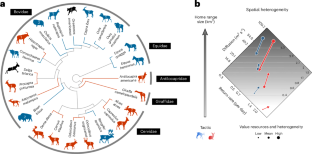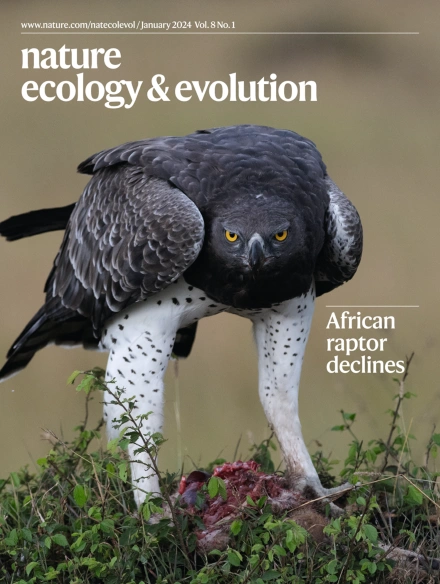大型食草动物后代运动能力影响母体资源获取
IF 13.9
1区 生物学
Q1 ECOLOGY
引用次数: 0
摘要
在生育后代前后,雌性的能量需求显著增加。大型食草动物雌性因此追踪食物资源,食物的可用性随时间和空间的变化而变化。一个多物种的GPS定位数据集显示,雌性动物获取食物的行动受到其后代的适应性反捕食行为的阻碍。本文章由计算机程序翻译,如有差异,请以英文原文为准。


Offspring movement ability influences maternal resource aquisition in large herbivores
The energetic needs of females increase markedly around the birth of offspring. Large herbivore females thus track food resources, the availability of which varies in time and space. A multispecies dataset of GPS locations revealed that female movement to reach food is hampered by the adaptive antipredator behaviour of their offspring.
求助全文
通过发布文献求助,成功后即可免费获取论文全文。
去求助
来源期刊

Nature ecology & evolution
Agricultural and Biological Sciences-Ecology, Evolution, Behavior and Systematics
CiteScore
22.20
自引率
2.40%
发文量
282
期刊介绍:
Nature Ecology & Evolution is interested in the full spectrum of ecological and evolutionary biology, encompassing approaches at the molecular, organismal, population, community and ecosystem levels, as well as relevant parts of the social sciences. Nature Ecology & Evolution provides a place where all researchers and policymakers interested in all aspects of life's diversity can come together to learn about the most accomplished and significant advances in the field and to discuss topical issues. An online-only monthly journal, our broad scope ensures that the research published reaches the widest possible audience of scientists.
 求助内容:
求助内容: 应助结果提醒方式:
应助结果提醒方式:


